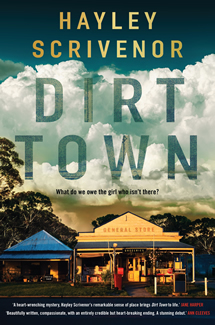Reviewed by Robert Goodman.
By Hayley Scrivenor, Pan Macmillan, $32.99.
 There is a lot of Australian rural crime around at the moment. While Jane Harper’s The Dry far from started the trend it certainly set a benchmark which many authors have tried to meet. The latest into the genre is Hayley Scrivenor who brings a slightly classical approach to her slightly historic rural crime debut Dirt Town.
There is a lot of Australian rural crime around at the moment. While Jane Harper’s The Dry far from started the trend it certainly set a benchmark which many authors have tried to meet. The latest into the genre is Hayley Scrivenor who brings a slightly classical approach to her slightly historic rural crime debut Dirt Town.
Dirt Town opens at the end of 2001, with the discovery of a body, eleven year-old Esther Bianci, buried in a shallow grave on a property outside of the town of Durton. This opening chapter is headed “We” and it is narrated by Scrivenor’s version of a Greek Chorus, the collective consciousness of the children of the town (and the ones who coined the nickname Dirt Town for their home). But the majority of the narrative, which immediately drops back to the day that Esther disappeared, is narrated through a range of point of view characters – Esther’s friends Ronnie and Lewis, her mother Constance and the lead investigator of the case Detective Sergeant Sarah Michaels.
So many Australian rural crime stories, including two of this year’s other debuts – Maryanne Cuskelly’s The Cane and Shelly Burr’s Wake – revolve around missing children. Many are set in the past and include child point of view characters (The Cane, again, but also Greg Woodland’s debut The Night Whistler among others) and use their scenario to deal with issues of sexual violence, domestic violence, toxic masculinity and the treatment of sexual identity. As crime fiction, they use the crime, its impacts and subsequent investigation to bring up long held secrets and tensions. All of which makes it difficult for a debut like Dirt Town to stand out from the pack.
But Dirt Town does manage to hold its own, which is no doubt why it was shortlisted for Penguin Literary Prize and won the Kill Your Darlings Unpublished Manuscript Award. Scrivenor delivers a deeply effective story set in a well realised community in a recognisable time (hard to believe it was only twenty years ago). The use of the chorus, in particular, gives a communal perspective of what people knew, what they suspected and what they ignored. And the resolution is both surprising and devastating.
Over 800 more book reviews can be found on Pile by the Bed.



